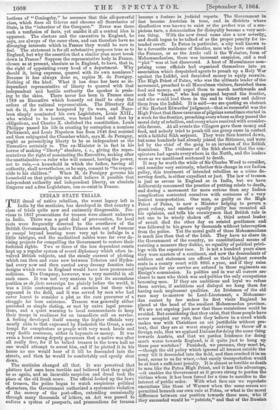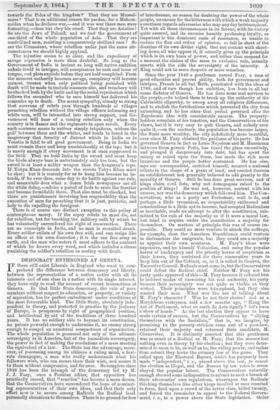INDIAN STATE TRIALS. T HE dread of native rebellion, the worst
legacy left to India by the mutinies, has developed in that country a class of trials quite new and eminently disagreeable. Pre- vious to 1857 prosecutions for treason were almost unknown in India. There was a good deal of provocation, for local riots were frequently directed to the overthrow of the British Government, the native Princes when out of humour or ennuye beyond bearing were very apt to indulge in a little intrigue, and the mediatized nobles were for ever de- vising projects for compelling the Government to restore their forfeited rights. Two or three of the less dependent courts kept up a regular system of secret diplomacy which often in- volved British subjects, and the steady current of plotting which ran then and runs now between Teheran and Hydra- bad every now and then carried away dreamy fanatics into designs which even in England would have been pronounced seditious. The Company, however, was very merciful in all such cases. It was not very anxious to put its anomalous position as de facto sovereign too plainly before the world, it was a little contemptuous of all enemies but those who appeared in the field, and it was served by men who had never learnt to consider a plot as the sure precursor of a struggle for bare existence. Treason was generally either punished as simple rioting, or met by extra legal precau- tions, and a quiet warning to local commandants to keep their troops in readiness for an immediate call on service. A feeling developed itself among the higher officials very nearly akin to that expressed by Frederick the Great, a con- tempt for conspirators as people with very weak heads and very feeble resources, either in bayonets or money. It was even a boast among deputy governors that a native was after all really free, for if he talked treason in the town hall no one would attempt to arrest him, and if lie plotted it in his house no one would hear of it till he descended into the streets, and then he would be comfortably and openly shot down.
The mutinies changed all that. It was perceived that plotters had once been terrible and believed that they might be so again, and an incurable suspicion and dread took the place of the old frank scorn. The official looked up the laws of treason, the police began to watch suspicious political characters, the Government authorized a systematic violation of the secrecy of the post-office, extending occasionally through many thousands of letters, an Act was passed to enforce a system of passports, and prosecutions for treason became a feature in judicial reports. The Government in fact became Austrian in tone, and in districts where disaffection was known to exist or the prefect was of a sus- picious turn, a denunciation for disloyalty became a very seri- ous thing. With the new dread came also a new severity,.
and death began to be talked of as the proper penalty for in- tended revolt. In Patna in particular, a city well known to be a favourite residence of fanatics, men who have embraced the Ferazee, or as the Arabs call it the Wuhabee, form ot Mohammedanism, there was incessant suspicion, and a real " plot " was at last discovered. A knot of Mussulmans com- prising some officials had organized themselves into an association which despatched agents to preach up a Holy War- against the Infidel, and furnished money to equip recruits.
The High Priest of Patna, who was the ultimate leader of the- movement, preached to all Mussulman visitors, furnished them food and money, and urged them to march northwards and seek the "Imam," who had appeared beyond the frontier, and who would lead them in the end to victory and deliver them from the Infidel. It is said—we are quoting an abstract of Sir Herbert Edwardes' judgment—that so successful was the- High Priest that three caravans of pilgrims sometimes started in a week for the frontier, preaching everywhere as they passed the moral duty of rebellion, and everywhere received with consider- able favour. At all events the villagers gave them money and food, and nobody tried to peach till one group came in contact. with a faithful Sikh serjeant. They were then hunted down, but some hundreds had already joined the Sittanees, and were- led by the chief of the gang to an invasion of the British dominions. The evidence of the Sikh showed that the con- spirators had agents everywhere in the North, and the leaders- were as we mentioned sentenced to death.
It may be worth the while of Sir Charles Wood to consider, and consider very seriously, whether this change in our Indian policy, this treatment of intended rebellion as a crime de- serving death, is either expedient or just. The law of treason is just as severe in England as in India, but we have deliberately renounced the practice of putting rebels to death, and during a movement far more serious than any Indian complication contented ourselves with sentences of a very lenient transportation. One man, as guilty as the High Priest of Patna is now a Minister helping to govern a. great colony, and another equally guilty has recanted all his opinions, and tells his countrymen that British rule is not one to be wisely shaken off. A. third actual leader of revolt died the other day an estated gentleman and, was followed to his grave by thousands without interruption from the police. Yet the moral guilt of these Mohammedans- is much less than that of the Irish. They have no share in the Government of the country, no constitutional means of resisting a measure they dislike, no equality of political privi- lege with the superior race. It is not a hundred years since they were masters of a continent, and now the descendants of soldiers and statesmen are offered as their highest rewards. seats in a county court with 800/. a year' and if they raise regiments for our service are refused in those regiments an Ensign's commission. In politics and in war all careers are closed to men who think war and politics the only occupations. becoming men. If they are ambitious and loyal we refuse them service, if ambitious and disloyal we hang them for having such unpleasant qualities. An Irishman of the old race may to-morrow be Lord-Lieutenant, a Mohamme- dan cannot by law unless he first visits England be, placed at the head of the smallest Mohammedan province. We are not arguing just now that these restrictions could be avoided. But considering that they exist, that these people have never accepted our rule, that they believe in a creed which makes war with Christians an act justifiable without pre- text, that they are at worst simply striving to throw off a foreign rule, that we applaud Italians for doing the same thing towards Austria, and that we pardon Irishmen for doing much worse towards England, is it quite just to hawg up these poor wretches ? Punished, we presume, they lim be, —though the old policy which ignored all treason outside the army till it descended into the field, and then crushed it in an hour, seems to us far wiser,—but surely transportation would be at least a sufficient penalty. It is almost as terrible as death to men like the Patna High Priest, and it has this advantage,. —it enables the Government as it grows strong to pardon the victims whom it has been forced for a time to sacrifice to the interest of public order. With what face can we reprobate executions like those of Warsaw when the same scenes are- permitted beneath our own rule at Patna, or what is the moral difference between our position towards these men, who if they succeeded would be "patriots," and that of the Russian towards the Poles of the kingdom ? That they are Mussul- mans ? That is an additional reason for pardon, for a Mahom- medan when he declares war,—and it was war these men were fomenting, —does but obey his creed. That they are Asiatics ? So are the Jews of Poland; and we took the government of one-third of the whole population of Asia. That they are uncivilized men, resisting a-comparatively civilized race ? So are the Circassians whose rebellion under just the same cir- cumstances we should highly applaud.
The injustice seems to us clear, and the expediency of savage repression is more than doubtful. So long as the Government of India is lenient so long will native ambition exhale itself in intrigue, will conspirators be rash and loose of tongue, and plots explode before they are half-completed. From the moment authority becomes savage, conspiracy will become earnest, treason when only political 'being punished with death will be made to include massacre also, and treachery will be checked both by the knife and by the social reprobation which follows the scoundrel who to save himself has delivered his comrades up to death. The secret sympathy, already so strong that caravans of rebels pass through hundreds of villages preaching rebellion without the village officers informing any white man, will be intensified into strong support, and Go- vernment will hear of a coming rebellion only when the country is in flames and the regiments in open revolt. Every such sentence seems to natives simply iniquitous' widens the gulf between them and the whites, and tends to breed in the magistracy that ferocity of distrust which in India as in Venetia is fatal to all good government. Being in India we must remain there and keep unmistakeably at the top ; but it is surely enough if every movement is at once suppressed in the field: That we hold India by the sword and must keep the blade always bare is unfortunately only too true, but the sword is at least a nobler weapon than the hangman's rope. If Yaliya Khan descends into the streets Yaliya Khan must be shot ; but it is scarcely for us to hang him because he in- tends,-if he ever dare, some day to do battle against our rule, and meanwhile does what a dozen Irish newspapers are all the while doing,—advise a parcel of fools to cross the frontier and become formidable there, That also must be checked, but there are punishments involving less responsibility than the execution of men for preaching that it is just, patriotic, and holy to die expelling the foreigner.
There is of course one distinct exception to this policy of contemptuous mercy. If the sepoy rebels he must die, not for rebellion, but for breaking the military oath by which he has voluntarily surrendered his right of insurrection. There are no conscripts in India, and no man is recruited drunk. Every soldier enlists of his own free will, and can resign like an officer at HS own discretion ; it is the one free army on earth, and the man who enters it must adhere to the contract of which he knows every word, and which includes a clause punishing the soldier's rebellion as mutiny with death.































 Previous page
Previous page